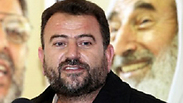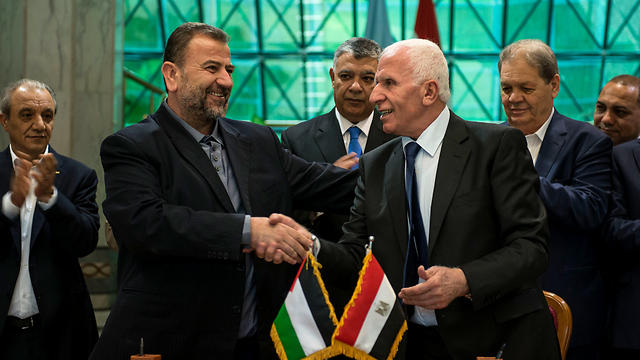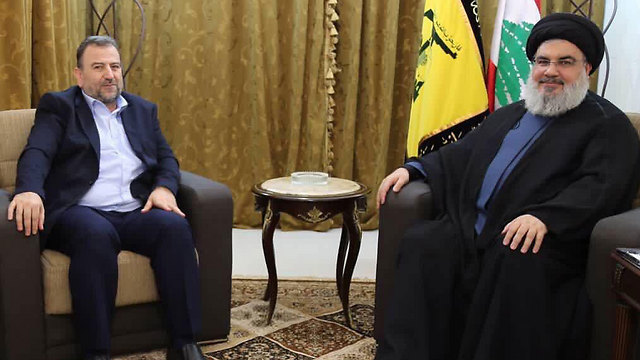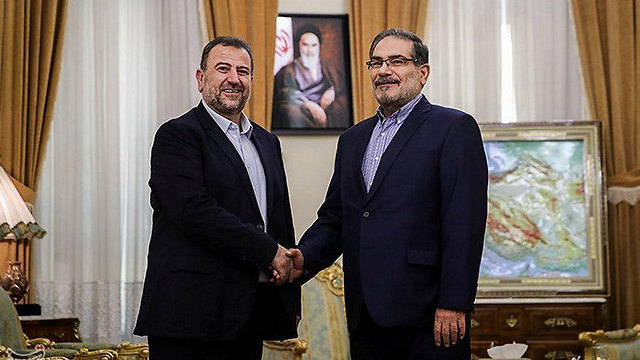

Hamas remotely strengthens grip on West Bank
Deputy Hamas chief al-Arouri, tasked with creating, administering organization's civilian, military infrastructure appointed West Bank 'shadow gov't' that oversees area from countries such as Lebanon, Jordan without fear of arrest by Israeli, PA forces; Hamas uses charitable organizations, youth clubs as front for operations.
Hamas has been struggling for over a decade with creating either civilian or military infrastructures in the West Bank due to the daily pressure it is constantly under, with the IDF and Shin Bet pressuring from one end and the Palestinian Security Forces from the other.
In fact, Hamas operatives are arrested nightly for trying to lay the groundwork for such infrastructure as well as for creating local cells in Palestinian villages and towns in the area.
Hamas's newly-appointed deputy chief Saleh al-Arouri has been tasked with constructing and directing his organization's military and civilian infrastructures in the West Bank. In his previous position, al-Arouri founded and headed Hamas's "West Bank Headquarters."
Al-Arouri, who is said to possess a strategic mind, has come to the realization over the past two years that Hamas's conduct in the West Bank has to change to gain any real foothold there. He therefore came up with a plan that had Hamas construct a sort of "mirror image" of the West Bank abroad.
The Hamas deputy chief tasked some of the organization's representatives in Jordan, the Gulf countries and Lebanon with responsibilities relating to West Bank operations. Those representatives' main advantage is they're immune from arrest due to their geographic locations, and can orchestrate operations safely from afar.
These operations include raising and transferring funds using money changers, money laundering, and smuggling cash through passengers entering the West Bank at the Allenby Border Crossing.
Most of the people Hamas placed in the aforementioned positions—some of which were prisoners released in the Gilad Shalit prisoner swap and deported to other countries—were either born or raised in the West Bank and the specific sectors they oversee.
By implementing this new policy—much bolstered over the past year—those same representatives can thusly hold meetings without fear of reprisal, formulate strategies as to Hamas's West Bank operations, coordinate the policy's implantation and discuss how funds dedicated to the West Bank should be allocated.
Al-Arouri presides over all of their actions, and makes sure to be well informed of all goings-on in the West Bank despite his lofty stature and other responsibilities. His clever methodology does not end there, however, as he has commenced a policy according to which Hamas will downplay and mask his true intentions by operating charitable institutions, youth clubs and social activities not immediately synonymous with Hamas.
It is for this reason that Hamas banners or photos of its leaders are never hung in the offices of the abovementioned organizations or displayed during their activities. The people administering them are not clearly affiliated with Hamas, and yet people attending their events know Hamas provides the money and support for them, which helps win over the locals' hearts and minds.
Hamas then does its absolute best to insert as much money as it can into the West Bank and then divvies it according to it needs. Families of terrorists receive funds without any return expected of them, which effectively buys their support of Hamas.
While Hamas is now investing more funds in developing civilian infrastructures to build a popular support base, it has not forsaken attempts—mostly directed from Gaza—to create small military bands to carry out terrorist attacks, another field under the watchful gaze of al-Arouri.


















